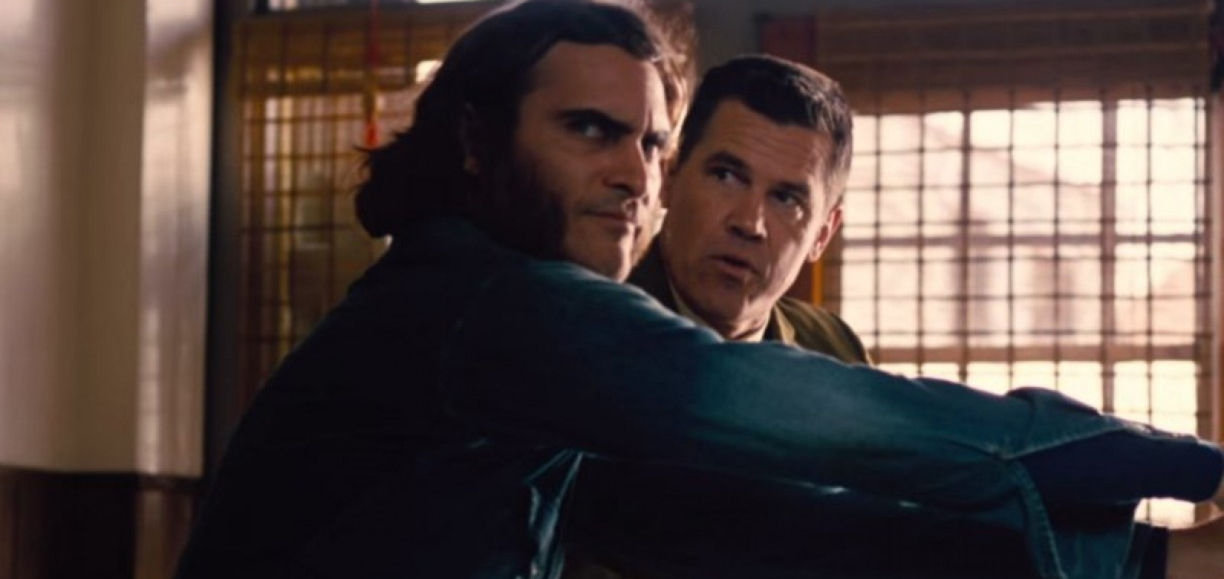In our third dispatch from New York Film Festival, we look at two of the most anticipated features this year from two acclaimed auteurs alongside a smug and manipulative documentary.
“I never remember plots of movies,” Paul Thomas Anderson said during his New York Film Festival masterclass this weekend. “I remember how they make me feel.” The same could be said of the director’s new film, Inherent Vice, screened as the festival’s gala centerpiece: Its noir narrative coils and dissipates like plumes of smoke against a hazy California sunset, but the high—giddy, dark and often very funny—lingers long after the credits.
Anderson is the first filmmaker to adapt the writing of notoriously reclusive Thomas Pynchon, and by most accounts he’s done a bang-up job. Pynchon’s 2009 novel, which is sometimes dismissed as “minor” by crazy people, concerns the gumshoe exploits of “Doc” Sportello, a kind of Raymond Chandler-on-acid who gets drawn into a tangled, druggy plot set against the twilight of peace-and-love in 1970 Los Angeles.
The sprawling, multi-character story suggested a return to the Anderson of Boogie Nights. That’s half-correct: Inherent Vice recalls the looser, anything-goes tempo of that earlier film, but it’s been refracted through the formal lens of The Master to create a funky, unpredictable tension.
Key to so much of the film’s jazziness is Joaquin Phoenix, who again collaborates with Anderson to create a character jittery with surprises. Anderson has always been good at catching unlikely performance moments on camera, but with Phoenix—here and in The Master—he’s taken things to another level. As “Doc,” Phoenix splits his time between investigating and getting high, and the genius of the performance is that it’s never certain which part of his mind seems to be functioning: he’ll enter a scene glazed, snap into a lucid state, and then vanish again into the foggy ether. Of all the American actors working today, it’d be hard to name anyone as compelling.
Inherent Vice is rife with other great performances, too. Josh Brolin’s suspiciously square, fellatio-obsessed detective is an ace comic creation, the kind of Dragnet cop whose attempts to maintain the law in the age of hippies have driven him to madness. As the film’s spectral narrator, singer-songwriter Joanna Newsom sprinkles the crazy events with a strange, crackled commentary, like a transmission from a radio deep inside Doc’s brain that someone has left between stations. Oh, and it’s amazing how much Martin Short has been missed: his scenes as a creepy, drug-addled celebrity dentist are sensational. More of this guy in everything, please.
With its stoned gallery of cops, hippies, new age freaks and rock star burnouts, Inherent Vice hums with the energy of a movie plugged directly in to an era where ’60s optimism splintered into drug paranoia, where the threat of cults seemed real and—as happens here—a case could be progressed via a clue sourced from a Ouija board.
It’s a heady mix that Anderson, channeling Pynchon, has made intoxicating. For all the film’s obvious antecedents—The Big Sleep, Chinatown, The Long Goodbye – Inherent Vice resembles nothing so much as it does a Paul Thomas Anderson joint, and it’s another unforgettable chapter in his journey through the mad, ridiculous soul of California.

The second film of the festival to examine the relationship between an aging actress and her assistant – after Cronenberg’s hysterical Maps to the Stars – Olivier Assayas’s Clouds of Sils Maria also features a bratty teenage superstar and a possibly cursed remake, though the similarities end strictly at the synopsis level.
Juliette Binoche plays revered actress Maria Enders, working in Switzerland with her assistant and confidante Valentine (Kristen Stewart), where she’s set to perform a stage remake of a film she starred in at 18. The script centers on a tragic affair between an older woman and—surprise—her younger assistant, with Enders this time tasked with playing the more experienced part and a Hollywood wild-child (Chloë Grace Moretz) cast as her lover.
Fashioned, according to Assayas, as a “brutalized version of The Bitter Tears of Petra von Kant,” Clouds has volumes of meta-text to play with: Binoche, Stewart and Moretz are essentially riffs on their “real life” actor selves, with Stewart, in particular, devouring the opportunity to comment on talented young stars stuck in the grind of corporate franchises.1 The screenplay has plenty of the usual to say on aging and cinema’s youth factory, but its most interesting aspects in this regard are Stewart and Binoche’s discussions of authenticity in performance: the former able to admire the depth of emotion in a presumably shallow blockbuster part, the latter dismissively elitist in calling it a cartoon.
It’s this dynamic between the two leads that makes the film a keeper. If the parallels between the relationship and the “play within a movie” are laid on with a heavy-hand, then Clouds – like Persona, at its best—creates something ineffable between Binoche and Stewart, moving from the obvious to a scenario approaching dream. It’s also the best thing Moretz has done since she learned how to curse a streak—a shame there isn’t more of her.
Ambiguity isn’t a notion you’ll find in Robert Kenner’s Merchants of Doubt, a documentary that takes on the pundits, pseudo-scientists and spin doctors in the employ of big businesses pushing back against the “threat” of climate change. Beginning with a magician demonstrating the art of misdirection – because it’s going to be one of those types of films – Merchants examines the history of clever PR men defending tobacco and chemicals before proceeding to go after the talking heads responsible for decrying global warming as a myth.
Without wishing to dispute a very valid concern, Kenner’s documentary is the sort of smug liberal showmanship that risks reading as bad as its targets. While an “objective” presentation isn’t necessarily essential (or even possible) in a doco, Merchants too often errs toward the Michael Moore technique of film debate, cheerfully mocking those it dislikes with manipulative editing and too-convenient music choices and falling into many of the sound-bite traps it decries. Slickly produced, probably to a fault, this is the kind of movie where David Bowie’s “Changes” is played over a montage of climate change discussion. Make of that what you will.
